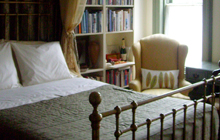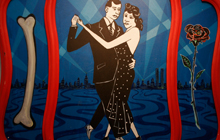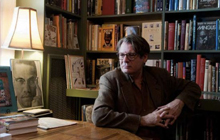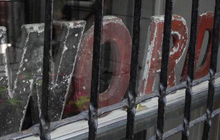Journals: SF/Mpls/NY, 1972-1973. Pt. 1
Synopsis
I started keeping journals in 1968 and, in 1971, I threw everything I’d written away. At 19 I wanted nothing more than to put it all behind me: my hometown, my family, but mostly me, the bad writer. My immersion in paperback literature was making a perfectionist out of me. There were 2 volumes of embarrassing bits of the trite suburban pubescence that is 16, the Utopian fantasies of 17, the pornography and juvenescence of 18. Family life was cold comfort. The Babbitry of home bored and angered me. I wrote it down so I could see what I was thinking and I didn’t like it.
Still, I have 3 1/2 feet of linear shelf of what happened to me, print-on-paper bound in spring binders, 6 feet if you include the photo albums, correspondence & paper ephemera all keeping time. The first 8 inches of the written, not typed, books illustrated herein are as well seen as read. These were the illuminating years, when public life was roiled with millenarian reveries and apocalyptic fears. Herein I could see things as they were.
When I’d fallen out with a bad crowd who didn’t read, I was fortunate to find even worse influences who did. With the principal characters herein I went to different schools of art together. James Crosby & I met 1968. I drew his attention for instigating a Vietnam War Moratorium at our high school, where I was a sophomore. He could draw and had one of the more perverse senses of humor it’s been my privilege to know. Perversity is a humor artists share. He was the first I met. Cros’ & I went back and forth from Minneapolis to post-Summer of Love San Francisco from ’69 to ’71, when I graduated high school and we were over our hippie trip.
Duncan Hannah, who I met in the school’s art room, I almost felt privileged to know, he was so splendiferous with his Klute haircut and Beatle-bottomed trousers. So well turned out. Rather posh. My family were the stolid Stearns County middle-class Sinclair Lewis wrote about in Main Street. Dunc’s family struck me as out of Lewis’s Babbit, his father a white collar lawyer, his mother, Bunny, an interior decorator. Given the polyester mess I was comparing them to they were tailored and accomplished. So was Duncan, who read, rocked, and who kept black bound books from the stationary store he pasted pictures and drew in with rapidograph pen. We were close friends until we preferred not to. He brought me out; not out-of-the-closet but out of the accident about to happen I was in the thrall of at home.
Steve Kramer, who Duncan introduced me to in 1969, and I were inseparable during the years of these journals. I sometimes think I have his memories. Duncan went away to college in New York. I visited Duncan at Bard College and came back to Minneapolis, ostensibly to try school in Minneapolis but largely to be with Kramer as we had it happening. I took college seriously for nearly a month, after which, if I didn’t have these journals, it’s unlikely I’d remember anything at all well. We drunk art and made art drunk. I’d understand it later as Dada, an antithesis by which to measure such things as art. Most of what I needed to know about art I learned in two years living with Kramer.
I followed Duncan, moving to New York in early 74 as best I can reconstruct it. It’s vague as I rarely dated entries. Kramer followed, Crosby followed, others followed. There were too many broken dates to keep track of, though I tried, but we kept time: high time, crazy as two waltzing mice time, swing time, and blues time but always jazz time. The last time I spent with Steve was nearly 40 years later, 30 sober for him. He came to Harlem when Jim died and I hosted the memorial. 20 min. of What Happened to You Since…? and we were still best friends.
Us boys, we’d all gone our separate ways. James I’d reestablished contact with after a couple decades out of touch and we were talking on a regular basis without connecting. You’d have thought he’d been imprisoned two hours away in Hudson. In a desultory manner, I was looking for him for over a year before we caught up with each other. I’d heard dubious and off-putting accounts. His devotion to art had turned gloomy. There was some play-acting, James being the consummate thespian – we were all fairly tortured individuals – but I never doubted my friend’s fragilities were his assets.
In the time of our generate youth, and in the tradition of the Baudelairean dandy, we were intoxicated by our muses. As the literal meaning of muse in French is “the beginning of rutting time,” there are some things herein I would not be so forthcoming about today. I was an unreliable author and neither we or our shes are the same people we were then.
It’s axiomatic to say everything changes in time. Steve and James left New York City and died. Steve, seemingly apropos of nothing, not so long after Cros’ and just after his 59th birthday. Such was the reputation he made for himself with his band The Wallets that the mayor of Minneapolis made it Steve Kramer Day.
Duncan and I stayed in NYC. Our relationship reminds me of Hamilton and Burr, the later of which I’ve come to represent. I last saw him at the Park Avenue Armory’s Antiquarian Book Fair the day after reading in the New York Times he’d won a Guggenheim Fellowship. He was justifiably proud and I was happy for him. Our youthful animosities complexities now seem puerile. Unlike Hamilton and Burr, we walked away from our incompatible tastes, contrasting styles, and irreconcilable differences.
Catholic school boys like me are all so about beating the Devil. As I am fond of saying, the facts don’t add up to the truth. If you were to stop the vid and read these entries it’ll help to know they’re written by a 19 year old going on 20, who didn’t know women as much as he wanted to, was a functioning alcoholic, had met about three black people, and was an even worse writer.
I wasn’t methodical, paid small attention to detail, was self-serving, spelled poorly, and thought a good deal with my dick. I’m still like that on a good day but on my better days I’m swimming in sync with now and then.
“And thanks for the memory,
Of letters I destroyed, books that we enjoyed,
Tonight the way things look, I need a book by Sigmund Freud…”
 Jumel Terrace B&B
Jumel Terrace B&B Life Turns Man Up & Down
Life Turns Man Up & Down The Private Library
The Private Library